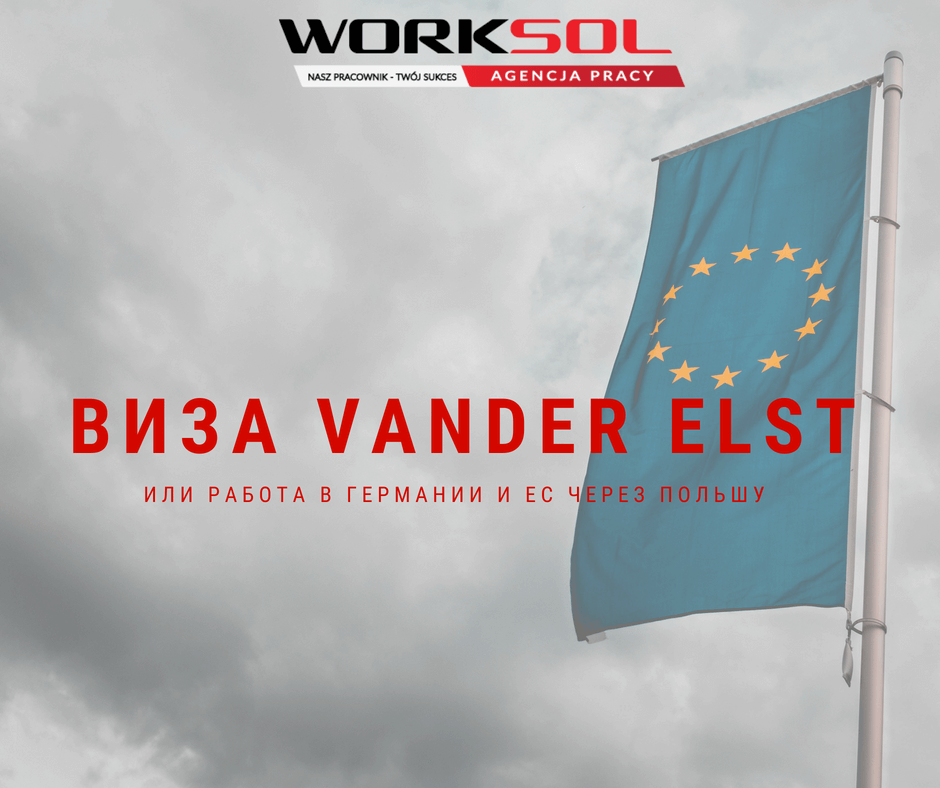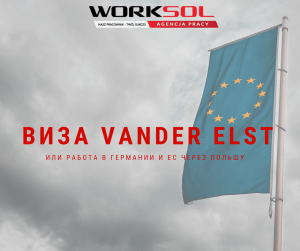

Vander Elst visa or work in Germany and the EU through Poland. Some Polish employers send their best employees abroad. From a side of employee, this is an extra income from his work. However, you cannot just go only by wishing it. This opportunity gives only a Van der Elst visa. You will learn where and how you can open a vander Elst visa, as well as all requirements and concerns. And all of these in you will know from this article.
Every Polish employer who has hired a foreigner can send him to work in Germany (it is concerned to citizens of Belarus, Georgia, Ukraine, Moldova). However, a foreigner needs a Vander Elst visa. Obtaining of such visa frees the employer from the obligation to have other permits for his employees if the one wants that his employee would working in the EU.

It is not possible to delegate temporary workers through requirement agencies to do a temporary work and base it on a Vander Elst visa. Such an application will be rejected by the German Consulate in Poland.
1. A foreigner should preferably have a long-term visa with a right to work, or a residence card, have social insurance contributions and insurance itself before he is living.
2. A foreigner has a signed employment contract with a Polish employer full-time employment contract (umowa o pracę).
3. A Polish employer has a contract for the provision of a service with a German service recipient.
4. Employment in Germany is not the main purpose of employing a foreigner. He cannot be hired only for secondment to work in Germany. Delegation must be random. Otherwise, the foreigner will need to have permission to work in Germany.
Foreigners who have a residence card for a long-term EU resident may be assigned to work in Germany, for a period of up to 3 months during the year without a Van der Elst visa.
Visa can be accepted only by The German Embassy in Warsaw. Besides, you must meet such conditions:
• The application must be complete and contain all necessary investments.
• Also, the application must be submitted in original together with two copies (in German).
• And the application is submitted personally by a foreigner.
• The application’s fee is 75 euros and is paid in zlotys in the main office of the Embassy.
• Two current biometric photos.
• Passport.
• A document confirming the existence of a work permit. There are work permit type A, a statement of assignment of work to a foreigner, a residence permit, etc.
• A contract concluded between a Polish and German company or a Polish company and an individual in German language.
• Help of the company that is providing services in Germany (separate for each applicant). Containing information about: employment contract regarding the method of calculating wages, proof of social insurance of the applicant (preferably from the beginning of the foreigner’s work until the moment of applying petition (winsoku) about visa). The expected time of commencement and termination of the sale of the service in Germany, the place where the service is performed and a brief description of the service being performed.
• An employment contract to work in Germany.
• A copy of the KRS of the employer and an extract from the German trade register (handelsregisterauzug) of the German legal entity to which the employee is sent.
• Proof of health insurance from ZUS, i.e. A1 and EKUZ card.
• You also need to remember that the embassy reserves the right to request additional documents.
It isn’t true that it’s enough to get an A1 certificate to legally delegate an employee in Germany.
It isn’t true that the employee should be regulated (at least 1 month before the delegation) to Polish social security (depending on the social security inspection).
It is not enough to have a temporary residence permit.
When applying for a Vander Elst visa one should be aware that the application must be filled in correctly and completely. The embassy won’t consider crookedly filled applications. Simply, you won’t be able to get the documents. That were mentioned above due to the of a lack of any attachments or documents. Unfortunately, such a statement will remain without consideration and the service charge will be canceled.
There is a loophole for you. Germany and other EU countries do not always require a Van der Elst visa.
It is not required when a Polish entrepreneur provides installation services for a finished product that is made in Poland for a period of no more than 2-3 days. For example, this is a carpenter who made a ladder in Poland and travels to the assembly to the customer.
Specialist in the legalization of residence in Poland and work in the EU.
[email protected]
The author of the original article
[email protected]
Author of translation
Recruitment of labour force from the East for the purposes of IT industry